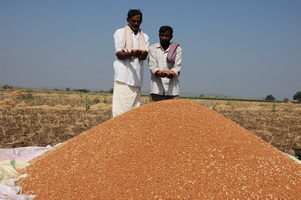
Global Team Sequences 429 Chickpea Lines from 45 Countries to Develop High-Yielding, Climate Resilient Crop
May 8, 2019| |

Lead researcher Dr. Rajeev Varshney said the team identified genes such as REN1, β-1, 3-glucanase and REF6 which can help crops tolerate temperatures up to 38 degrees Celsius and produce higher yields. Genome-wide association studies identified 262 markers and several candidate genes for 13 traits.
The study also tracked the origins of chickpeas, and confirms that the crop came to India from the Fertile Crescent/Mediterranean via Afghanistan and may have been introduced back to the primary centers of origin after 200 years. "Our study indicates Ethiopia as a secondary center of diversity and also maps a migration route from the Mediterranean/Fertile Crescent to Central Asia, and in parallel from Central Asia to East Africa (Ethiopia) and South Asia (India)," said Dr. Varshney.
Results published in Nature Genetics state that more than 90% of chickpea is planted in India, where the highest genetic diversity was observed.
For more details, read the news releases from ICRISAT and the University of Western Australia.
| |
Biotech Updates is a weekly newsletter of ISAAA, a not-for-profit organization. It is distributed for free to over 22,000 subscribers worldwide to inform them about the key developments in biosciences, especially in biotechnology. Your support will help us in our mission to feed the world with knowledge. You can help by donating as little as $10.
-
See more articles:
-
News from Around the World
- Global Team Sequences 429 Chickpea Lines from 45 Countries to Develop High-Yielding, Climate Resilient Crop
- Genome Analysis of African Yam Backs Niger River as Cradle of African Agriculture
- Scientists Release Most Accurate Peanut Genome Sequence to Date
- Researchers Identify Cause of Seed Abortion and Role of RNA Pol IV Enzyme in Seed Development
- New Gene Metrics Increase Precision of Plant Breeding Technology
- Climate Extremes Explain 18%-43% of Global Crop Yield Variations
- Genomes of 480 Wheat Varieties Reveal Evolution, Human Sociocultural History
- Study Reveals Climate Change Boosts Banana Disease
- Healthful Oils from GM Plant as Effective as Fish Oil
-
Research Highlights
- Experts Characterize Cadmium-responsive MiRNAs and their Target Genes in Maize
-
Announcements
- ASEAN-U.S. Science Prize for Women
-
Resources
- Interactive Map Shows Crop Field Trial Sites in Australia
-
Plant
- Study Shows How Nature Makes Solution to Hidden Mutations
- CRISPR-Cas9 Used to Recover Red Pigmentation in Elite Rice Varieties
-
Read the latest: - Biotech Updates (December 10, 2025)
- Gene Editing Supplement (November 26, 2025)
- Gene Drive Supplement (February 22, 2023)
-
Subscribe to BU: - Share
- Tweet
